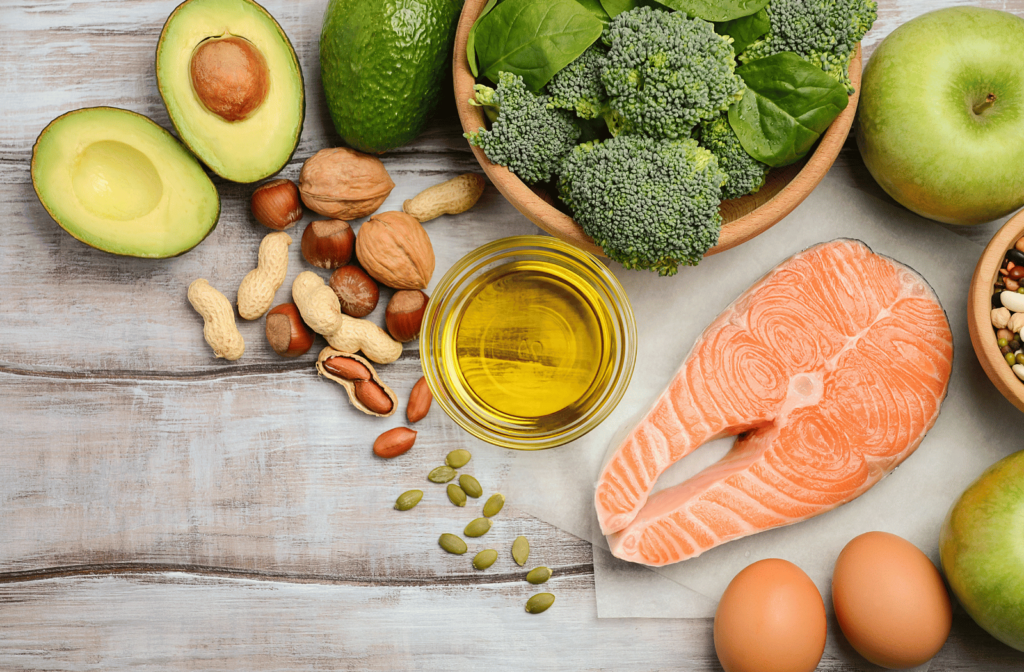Dry eye is a common eye problem. According to a survey commissioned by the Alberta Optometry Association, 90% of Albertans suffer from dry eye. Symptoms can range from uncomfortable to severe, affecting concentration and vision.
But dry eye is often caused by multiple factors, from environmental factors like the dry Albertan climate to personal factors like tear quality. Even diet can affect your eyes. As a result, managing dry eye can require a diverse approach, including supporting treatment through vitamins and minerals.
Eye nutrition can help reduce risk factors for dry eye. Omega-3 and vitamins A, B12, and D are some of the top dietary recommendations for improving dry eyes.
Omega-3
Omega-3 fatty acids (or fish oil) are the most common go-to for dry eye diet support. Research into their benefits has found a correlation between omega-3 and improved tear quality. When tears lack the necessary oily layer, or the meibomian glands cannot effectively produce enough, tears evaporate too quickly.
Your eyes need more than water to function and feel comfortable. By supporting oil (meibum) production, tears stay on the eye longer, preventing dryness or irritation.
Additionally, when the body breaks down omega-3s, it also releases anti-inflammatory properties, helping to prevent or reduce problems caused by meibomian gland dysfunction.
Fish oil supplements and fatty fish contain the highest amounts of omega-3. But there are additional dietary sources for omega-3, such as:
- Brussels sprouts & spinach
- Chia seeds & flaxseed
- Meat & dairy products
- Oysters, mussels, crab, & squid
- Soybeans, black beans, & lentils
- Walnuts, pecans, & pistachios
Vitamin A
Vitamin A is a fat-soluble vitamin, either found in animal-sourced food or made by the body with help from carotenoids found in plants. The eye uses vitamin A to produce pigments needed to detect light or colour. The vitamin also helps nourish the eye, including maintaining surface moisture.
Dry eye can result from vitamin A deficiency. Mild vitamin A deficiency can alter the conjunctiva (clear tissue covering the eye’s surface). A severe deficiency can lead to xerophthalmia—a progressive eye disease contributing to conjunctiva dryness, thickening, wrinkling, and lesions. The irritation can also cause corneal ulcers (an open sore on the eye’s surface).
Some food sources high in vitamin A include:
- Cantaloupe, mango, & grapefruit
- Collards, spinach, & kale
- Cheddar, camembert, & goat cheese
- Liver (beef, goose, lamb)
- Salmon, trout, & bluefin tuna
- Sweet potato & winter squash
Vitamin B12
Vitamin B12 is a water-soluble vitamin used by the body to help repair DNA and nerve cells. Unfortunately, it’s an essential nutrient the body cannot produce, so it needs to be consumed through diet or supplements.
Dry eye symptoms and nerve-related eye pain is associated with vitamin B12 deficiency. The cornea (front centre of the eye) is highly sensitive tissue because it has a high concentration of nerve endings. Therefore, vitamin B12 levels can be crucial for maintaining healthy nerve function in the cornea, reducing uncomfortable dry eye symptoms (including burning and light sensitivity).
Sources of B12 include:
- Animal liver & kidneys
- Clams, sardines, salmon, trout, & tuna
- Beef
- Eggs
- Fortified foods (cereals, non-dairy milk)
- Milk & dairy products
Vitamin D
Vitamin D is another fat-soluble vitamin. Our bodies make vitamin D when our skin is exposed to sunshine, but we can also find it in foods or supplements.
The body needs vitamin D for absorbing (and retaining) calcium and phosphorus—minerals crucial for healthy bones, muscles, and tissue. Vitamin D also helps our bodies control infection and reduce inflammation.
Vitamin D can be good for dry eyes in multiple ways. Primarily, it supports tear quality, improving the concentration and stability of the tear film. Maintaining the 3 components of the tear film keeps the surface moist and clear, protecting the eye from dryness and infection.
Reducing inflammation is another benefit for eye health. When tear glands are irritated or inflamed, it can block tear production.
Sunlight is a vital ingredient for making vitamin D, which means a lack of sunlight can lead to vitamin D deficiency. When our bodies are deprived of vitamin D, it can impact our eye health. Additionally, ensuring you get enough vitamin D can help support dry eye treatments, such as artificial tears (lubricating eye drops).
Vitamin D deficiency is more likely when you:
- Have a darker skin complexion (due to high melanin)
- Live in an area with high pollution
- Spend more time indoors
- Use sunscreen or sun-blocking layers
Although blocking light can prevent vitamin D production, sun safety is still crucial. UV exposure can increase the risk of developing dry eye. Therefore, keep using sunscreen and wear your sunglasses outdoors! Instead, focus on adding additional dietary sources to support vitamin D levels.
However, consult your doctor before significantly increasing your intake through diet or supplements. Although vitamin D is necessary, too much of a vitamin—vitamin D or another variety—can have harmful side effects. Overusing supplements to boost your vitamin intake can cause vitamin toxicity.
Food sources high in vitamin D include:
- Salmon
- Herring & sardines
- Cod liver oil
- Canned tuna
- Egg yolks
- Mushrooms
- Fortified foods (cereal, milk)
Visit Us for More Dry Eye Care
Managing eye health naturally through diet and nutrition can have multiple benefits. However, dry eye therapy can offer more comprehensive care when dry eye symptoms are severe or interrupting your daily life. We’d love to share eye nutrition tips and help alleviate your symptoms with a personalized treatment plan.
Visit Total Focus Optometry today to discuss your eye care!



